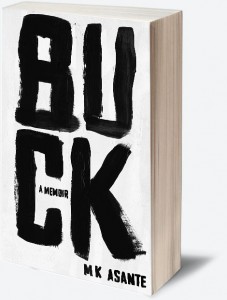 Baltimore County School District has caved to pressure from parents and removed MK Asante’s award winning memoir Buck from the curriculum at Digital Harbor High School.
Baltimore County School District has caved to pressure from parents and removed MK Asante’s award winning memoir Buck from the curriculum at Digital Harbor High School.
Parents claimed profanity, as well as graphically described sexual acts, were the reasons Buck was inappropriate for 9th graders. Out of a 272-page book, parents complaints mostly centered around one out-of-context chapter that was set in a strip club.
The televised news report from NBC affiliate WBAL misleadingly referenced “a passage on page 96 depicting a party reads: ‘Boom boom boom — the bass from Luke’s face down (expletive) up, that’s the way we like to (expletive)’” without bothering to cite the fact that Asante is actually quoting the main lyric from a famous 2 Live Crew song and not something happening at the party.
Buck tells the story of Asante’s teenage years in North Philadelphia, navigating the lure of sex, drugs, and violence in the absence of a family ripped apart by incarceration and mental illness. Buck received the In The Margins Award and was nominated for an NAACP Image Award for Outstanding Literary Work in Autobiography. It was also an Alex Award finalist, an award from the American Library Association recognizing adult books that appeal to adolescents.
While this report said Asante was unavailable to comment, another report from CBS affiliate WJZ quotes Asante as saying the teachers of Baltimore are using the text to talk about “misogyny, objectification, and violence in our communities.” He also states that he believes most “backlash legitimately comes from people who haven’t read the book.”
Baltimore City Schools released the following statement:
“Buck is not part of the approved curriculum, and it will be replaced with a different, approved text for subsequent lessons at Digital Harbor High School. Administrators at the school have met with the teaching staff to reinforce requirements around use of approved resources.”
An examination of Baltimore’s school board policies reveals the process upon which those resources are approved is vague, as is the process for complaints and challenges to reading material in the classroom. The ambiguity in the language is worrisome because without a unified and transparent process for the community to express concerns, the students are at risk of having their First Amendment right’s violated whenever the district feels a book they are reading isn’t worth the hassle of standing up to a handful of angry parents.
Even though Baltimore County Schools failed to keep Buck in the classroom, other school districts, such as Philadelphia, are still developing curriculum to help teach this seminal work.
Help support CBLDF’s important First Amendment work by visiting the Rewards Zone, making a donation, or becoming a member of CBLDF!